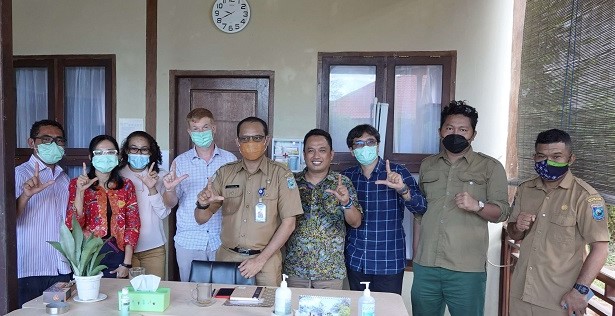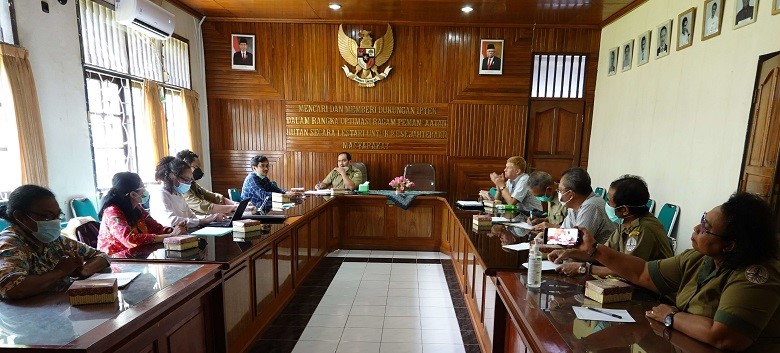FORCLIME
Forests and Climate Change ProgrammeTechnical Cooperation (TC Module)

Select your language

In an effort to attain inputs, particularly as regards locations that have the potential to be selected as pilot villages, FORCLIME organized a coordination meeting with the Customary Community Task Force (Gugus Tugas Masyarakat Adat-GTMA) on 22 June 2021 in Jayapura, Papua Province. The meeting was opened by Assistant I of the Regional Secretariat of Jayapura Regency, acting as Chair of the GTMA, Mr. Abdul Rahman Basri.
In Jayapura Regency, the GTMA, in collaboration with a number of other development partners, has carried out the mapping and facilitation of various Customary Communities (Masyarakat Hukum Adat - MHA) within the Jayapura Regency area. Said mapping activities, as undertaken by GTMA, include the mapping of the Buyaka customary area (outside of Lake Sentani), the Oktim customary area (which covers Unurumguay, Kaureh, Yapsi and Airum), the Dmutru customary area (which covers Nimboran, Elseng in Kemtuk and Kemtuk Gresi Districts), the Imbinumbay adat (which covers Rafinerara District bordering Jayapura City) and the Yewena Yonsu customary area (which covers Depapre District in Tablasupa and Tablanusu villages). In addition, the GTMA, working in collaboration with the technical implementing unit of the Ministry of Environment and Forestry in Papua (BBKSDA) and the Jayapura Regency Government has succeeded in motivating 11 villages within the Nimbokrang area to sign an agreement aimed at turning their specific area into a customary conservation forest.
A follow-up to the coordination meeting was held in order to identify and determine the locations of FORCLIME 4.0 pilot villages that would develop social forestry programmes. The determination of these locations has taken into account the readiness of villages, as demonstrated through the active involvement of other parties, including the forestry agency in Jayapura.
For more information, please contact:
Rut Ohoiwutun, Junior Advisor for Community Forestry and Hutan Adat
Theodora F. Resubun, Advisor for Sustainable Forest Management and Coordinator for Papua Province

In order to follow up on the FORCLIME 4.0 programme planning workshop in West Papua, the FORCLIME team held a coordination meeting with the Regional Research and Development Agency (Balitbangda) of West Papua Province as a member of the FORCLIME 4.0 Program Steering Team on 21 June 2021 in Manokwari, West Papua. The meeting was also attended by representatives from the Planning Bureau of the Ministry of Environment and Forestry.
The coordination meeting aimed to set a firm direction for the Balitbangda of West Papua Province regarding the implementation of FORCLIME 4.0, as well as to acquire information and gain an understanding of the activities that have been and that will be carried out in West Papua Province by the government and its development partners. The meeting discussed three main points, specifically the preparation of the 12th Flora Malesiana International Symposium in Manokwari, the construction of a museum and research centre related to biodiversity, and the sharing of information on the doctoral programme on the Basic Income concept, which is a collaboration between the University of Indonesia and the University of Freiburg Germany.
The implementation of the Flora Malesiana International Symposium offers an opportunity for FORCLIME to share information related to the Gap Study on the Access and Benefit Sharing Mechanism. Currently, FORCLIME, represented by Nita Yohana, has been involved in the Working Group of the 12th Flora Malesiana International Symposium. The plan is that FORCLIME will be given one venue at this event.
For more information, please contact:
Nita Yohana, Advisor for Sustainable Forest Management and Coordinator for West Papua Province
Melanesia Brigite Boseren, Junior Advisor for Rural Livelihood, Forest Management and Conservation, West Papua
Mohammad Sidiq, Strategic Area Manager for Sustainable Forest Management and Coordinator for Papua and West Papua Provinces

One of the activities set out under the FORCLIME 4.0 Strategic Plan is support for the development of sago and massoi commodities alongside the Environmental and Forestry Research and Development Center (Balai Litbang LHK) in Manokwari through agroforestry programs and assistance in pilot villages. In line with these goals, the FORCLIME Team held a coordination meeting with Balai Litbang LHK on 21 June 2021 in Manokwari, West Papua. The meeting was also attended by representatives from the Planning Bureau of the Ministry of Environment and Forestry.
During the meeting, several potential collaborations as regards the implementation of FORCLIME 4.0 activities were discussed, including involvement from NGOs and the private sector, as well as support for the dissemination of research results produced by Balai Litbang LHK Manokwari. As a follow-up, the FORCLIME team in West Papua will coordinate with the West Papua Forestry Service, the Tambrauw Production Forest Management Unit (KPHP) and the South Sorong KPHP in order to identify potential pilot villages and commodities.
“The presence of FORCLIME within West Papua is an honor for us and we want to work together in order to support programmes that will be implemented across West Papua,” explained Mr Pudja Mardi Utomo, Researcher at Balai Litbang LHK Manokwari.
For more information, please contact:
Nita Yohana, Advisor for Sustainable Forest Management and Coordinator for West Papua Province
Melanesian Brigite Boseren, Junior Advisor for Rural Livelihood, Forest Management and Conservation, West Papua
Mohammad Sidiq, Strategic Area Manager for Sustainable Forest Management and Coordinator for Papua and West Papua Provinces
 |
Supported By: |
  |